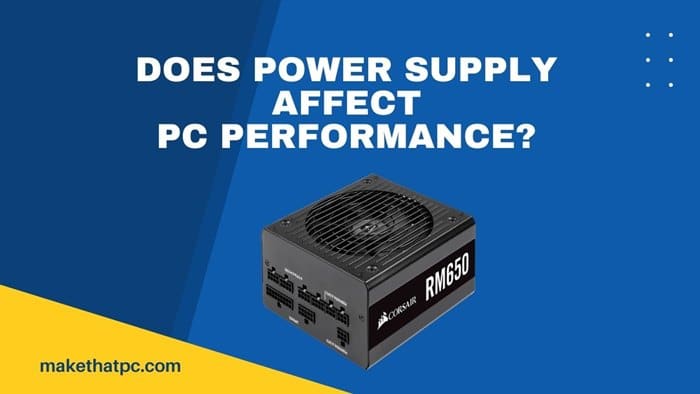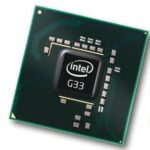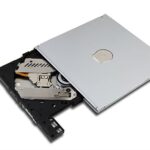Power Supplies are often considered as the least important PC components. In fact, a lot of people try to cut down on their power supplies and invest that extra money in their CPUs, motherboards, Graphics Cards, etc. But, that’s not a good thing to do at all.
A power supply supplies power to everything on your computer.
So, it shouldn’t be compromised at all. But, that’s a different topic for another day. Today, I am going to talk about the effects of a power supply on PC performance.
Although a power supply will not have any direct impact on your system’s performance, it can help you with achieving high and stable performance. Also, it ensures the maximum reliability of your component by offering power without fluctuations. Even a very cheap power supply with a low rating can get your PC working without any issues. But, the things going on under the hood can cause issues not only for the PC components but for the power supply itself.
So, it’s not only about the performance but also about the longevity of your build. So, we are going to discuss why a good power supply is important if you want to achieve the best performance out of your computer.
Choosing the right size of power supply isn’t simply enough. You will have to pay a closer look at the technical specifications. Don’t worry, I am going to help you with all these things.
Importance of a good power supply in any computer
Computers are electronic devices. They need a constant supply of power in order to keep working. And, we all know that the power supply is the main element that does that for us. But, this isn’t the only thing your power supply does for you. There is more to it.
A power supply takes its main input from your electricity socket. Then, it converts that AC electricity to DC supply and then adjusts its voltage to around 12V DC. This all happens by passing that AC supply through complex rectifiers circuits.
There is always some sort of noise in the received DC supply from the rectifiers. So, the manufacturers use certain filters to create a constant DC supply.
All these circuits are made with physical electronic components such as resistors, capacitors, transformers, inductors, etc. So, a good supply will be using good components while a cheap power supply will surely compromise with them.
Now, you know that the PC components such as CPU, RAM, motherboard, etc are very delicate. Any small fluctuation in that supply can cause issues with them. Fortunately, our motherboards also come with the VRMs which then further control and regulate that DC supply which I have discussed in this article. But, still, if the main supply is giving a fluctuated power to the board, there are going to be some issues later down the road.
Why do you need a good power supply in order to achieve a good performance?
Literally, there is no direct relationship between the power supply and the system’s performance. As we discussed earlier, any low-end power supply with work perfectly fine for any system as long as you are matching the required wattage with the power supply’s wattage.
But, if you want a good performance, you would need to have good components as well. A powerful CPU, good RAM, and a strong GPU will demand a lot of power. So, first of all, you should have enough wattage to support those components. Also, the power should be efficient enough to let those hardware pieces work to their full potential.
If the supply isn’t constant or has a lot of noise, those components will never be able to offer their best potential. The motherboard is also affected by this inconsistent power supply because it needs to provide the right kind of voltage to the components through its own circuitry. In other words, you are putting an unnecessary load on almost all your PC components just by saving some money on your cheap power supply unit.
What actually makes a good power supply?
There are some must-haves to a good power supply. These include a great cooling system, strong capacitors, a better rectifying circuit, and definitely a good efficiency rating. All the power supplies these days come with the 80+ efficiency rating which means they are capable of converting at least 80% of the total power incoming from the socket.
Rails are another important aspect when it comes to the quality of power supply. The power actually goes to your components through the rails. The most important rails are the ones by which the power goes to the CPU and PCIe cards. At least 18 Amperes of current on any rail is required with the current computers. This current requirement will increase and go up to 34A when you are working with the top-end graphics cards.
Power supply rating is another considerable factor when you want to choose a good product. 80 Plus is the minimum requirement for any computer. But, for the latest motherboards and other hardware components, you should go beyond the normal 80 Plus or even 80 Plus White power supplies. 80 Plus Titanium is the best power supply rating you can opt for. But, this will be more expensive and suitable for high-end builds with more reliability requirements. For normal users, 80 Plus Gold is always known to be the most suitable power rating.
Power supply companies also talk a lot about the type of capacitors. But, this goes in a more technical arena. But, you can still see what kind of capacitors are used in your power supply and how they are supposed to perform as compared to the others.
Understanding the power supply ratings
80 Plus is the normal power supply rating as we discussed above. But, what does that mean?
Well, an 80 Plus power supply simply means that the circuit will give you 80% percent DC supply out of the total input AC provided by the main input. 20% of which is lost in the form of heat and also during the operations of its own components.
This DC power production will vary as per the total load we are putting on the power supply.
Now, there are some other improvements you will see in any 80 Plus power supply. These ratings actually represent the power supply’s efficiency factor.
| Percentage of Rated Load | 10% | 20% | 50% | 100% |
|---|---|---|---|---|
| 80 PLUS/80 PLUS White | – | 80% | 80% | 80% |
| 80 PLUS Bronze | – | 82% | 85% | 82% |
| 80 PLUS Silver | – | 85% | 88% | 85% |
| 80 PLUS Gold | – | 87% | 90% | 87% |
| 80 PLUS Platinum | – | 90% | 92% | 89% |
| 80 PLUS Titanium | 90% | 92% | 94% | 90% |
You can see with the help of this table that the higher the metal rating of your 80 Plus power supply, the higher will be its efficiency. It simply means that the power supply is capable of converting a higher amount of the input supply into a usable DC supply for the computer.
What are the signs of a bad power supply?
The first main sign is that it will be available at a dirt-cheap price. The capacitor utilized will be crap. This supply will generally don’t have a modular design. Most probably, the manufacturer will hide most of its technical specifications. The next big sign of a bad power supply is that it will have a low-efficiency rating. Any power supply rated for 80 Plus/80 Plus White is known to have just the minimum required efficiency levels for any system.
A bad power supply will have a bad design and weak build quality. It will make a lot of noise and heat up too much. Also, it will consume a higher amount of power and this will surely add up to your electricity bills.
Can a power-supply limit CPU or graphics power?
Again, there is no relation between your CPU and graphics card performance and the power supply. But, because the power supply fulfills all their power requirements, you should surely invest in a good one. It will never cause issues with the performance in any way. But, when you put a bad power supply under a huge workload, it generally tends to show its bad signs.
Also, a power supply will never blow up your components due to its inefficiency or any breakdown. But, it may damage itself if something is wrong inside the circuits. There are hardly any chances that your power supply gives a sudden strike of high voltage and burns down your components. But, due to its work nature, it will damage itself if there is something wrong going on.
So, what should be your next step?
If your aim is to work with a normal CPU and build a computer that isn’t performance-oriented, there is no point in going for those high-end power supplies with maximum efficiency. However, if you have enough budget, you can always choose to go for the best options available.
But, if you are building a performance/gaming PC or looking to upgrade the power supply of an existing one, you should try to go for at least 80 Plus Gold. If you can afford a Platinum or Titanium supply, your components and the whole system will thank you for their life.
Thanks for reading!

I am Anshul Rana, an experienced author specializing in PC gear reviews and Windows 10 software tutorials. With a strong passion for technology and an in-depth understanding of the PC industry, I provide insightful and detailed analyses of computer peripherals, gaming gear, and software solutions. My writing style is concise yet informative, making complex topics accessible to both beginners and advanced users. Through my reviews and tutorials, I aim to offer valuable guidance, helping readers make informed decisions to enhance their PC experience and explore the vast possibilities of Windows 10 software.










